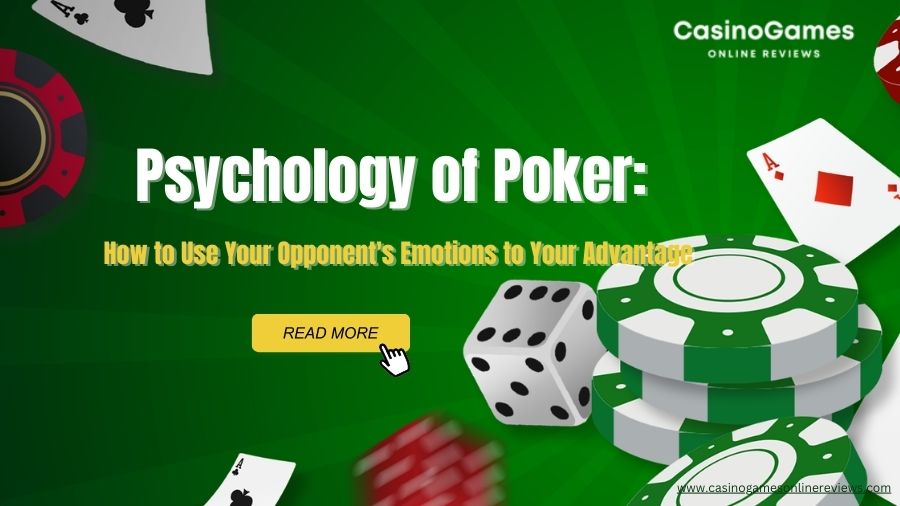Do you ever wonder what separates the world’s top poker players from the rest? Beyond their superior knowledge of the game and exceptional mathematical skills, these players possess a deep understanding of poker psychology. In this blog post, we’ll delve into the art of using your opponents’ emotions to your advantage, ultimately helping you win more often at the poker table.
We’ll explore the key emotions that can impact players’ decision-making abilities and provide you with practical tips to capitalize on these emotions. By mastering the intricacies of poker psychology, you’ll not only boost your win rate but also gain invaluable insight into the human mind. So, are you ready to unlock the secrets of poker psychology and start outplaying your opponents?
Contents
Understanding the Basics of Poker Psychology
Poker is a game of incomplete information. You do not know what cards your opponents have, and they do not know what cards you have. As a result, you have to make educated guesses based on your opponents’ behavior and the cards on the table.

The psychology of poker revolves around two key concepts: bluffing and tells. Bluffing is when you make a bet or raise with a weak hand to convince your opponents that you have a strong hand. Tells are physical or verbal cues that your opponents give away, which reveal the strength or weakness of their hand.
The ability to bluff effectively and read your opponents’ tells is what separates the best poker players from the rest. By understanding these concepts, you can use your opponents’ emotions to your advantage and win more often.
Using Your Opponents’ Emotions to Your Advantage
In poker, emotions play a significant role. Even the most experienced players can get emotional when they are dealt a bad hand or lose a big pot. As a result, their decision-making ability is impaired, and they become more predictable.
Here are some emotions that you can use to your advantage in poker:
Fear
Fear is one of the most common emotions that poker players experience. When players are afraid, they tend to play conservatively and avoid taking risks. You can use this to your advantage by making large bets or raises when your opponents are afraid.
Anger
Anger is another emotion that can be useful in poker. When players are angry, they tend to play aggressively and make rash decisions. You can use this to your advantage by playing passively and waiting for your opponents to make mistakes.
Greed
Greed is a powerful emotion that can cloud a player’s judgment. When players are greedy, they tend to take unnecessary risks and make poor decisions. You can use this to your advantage by playing conservatively and waiting for your opponents to make mistakes.
Frustration
Frustration is a common emotion in poker, especially when players are on a losing streak. When players are frustrated, they tend to make irrational decisions and take unnecessary risks. You can use this to your advantage by playing passively and waiting for your opponents to make mistakes.
Tips for Using Your Opponents’ Emotions to Your Advantage
Here are some tips for using your opponents’ emotions to your advantage in poker:
Pay attention to your opponents’ behavior
The key to using your opponents’ emotions to your advantage is to pay attention to their behavior. Watch for physical and verbal cues that reveal their emotions, such as fidgeting, sweating, or changes in tone of voice.
Stay calm and composed
In poker, it is important to stay calm and composed, even when you are feeling emotional. If your opponents sense that you are emotional, they may try to use your emotions against you.
Use your emotions strategically
While it is important to stay calm and composed, you can also use your own emotions strategically. For example, if you want to bluff, you can pretend to be nervous or anxious to convince your opponents that you have a weak hand.
Don’t be predictable
The key to winning at poker is to be unpredictable. If your opponents can predict your behavior, they can use it against you. Mix up your playstyle, and don’t be afraid to take risks.
Know when to fold
Knowing when to fold is just as important as knowing when to bet. If you have a weak hand, it is better to fold and wait for a better opportunity. Don’t let your emotions cloud your judgment and force you to make poor decisions.
Practice
The more you play poker, the better you will become at reading your opponents’ emotions and using them to your advantage. Practice online or with friends to hone your skills and become a better player.
Conclusion
In conclusion, mastering the psychology of poker is a crucial aspect that sets apart the best players from the rest. By effectively utilizing opponents’ emotions like fear, anger, greed, and frustration, a savvy player can make informed decisions that maximize their chances of winning.
This blog post has explored the importance of understanding the basics of poker psychology, such as bluffing and tells, as well as practical tips for leveraging your opponents’ emotions to your advantage.
The key to success in poker is staying calm, composed, and unpredictable while paying close attention to your opponents’ behavior. Remember to practice regularly to hone your skills, and don’t be afraid to fold when necessary. By embracing these principles, you can elevate your poker game, outplay your opponents, and create lasting memories at the poker table.